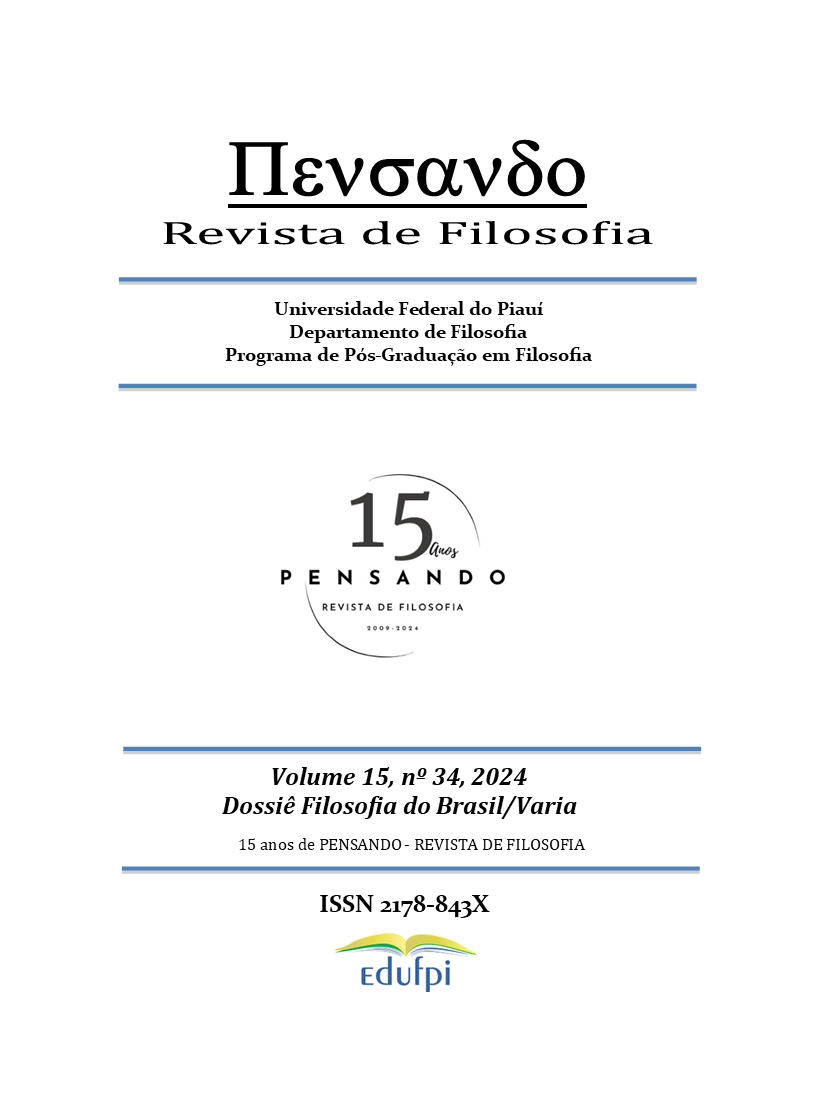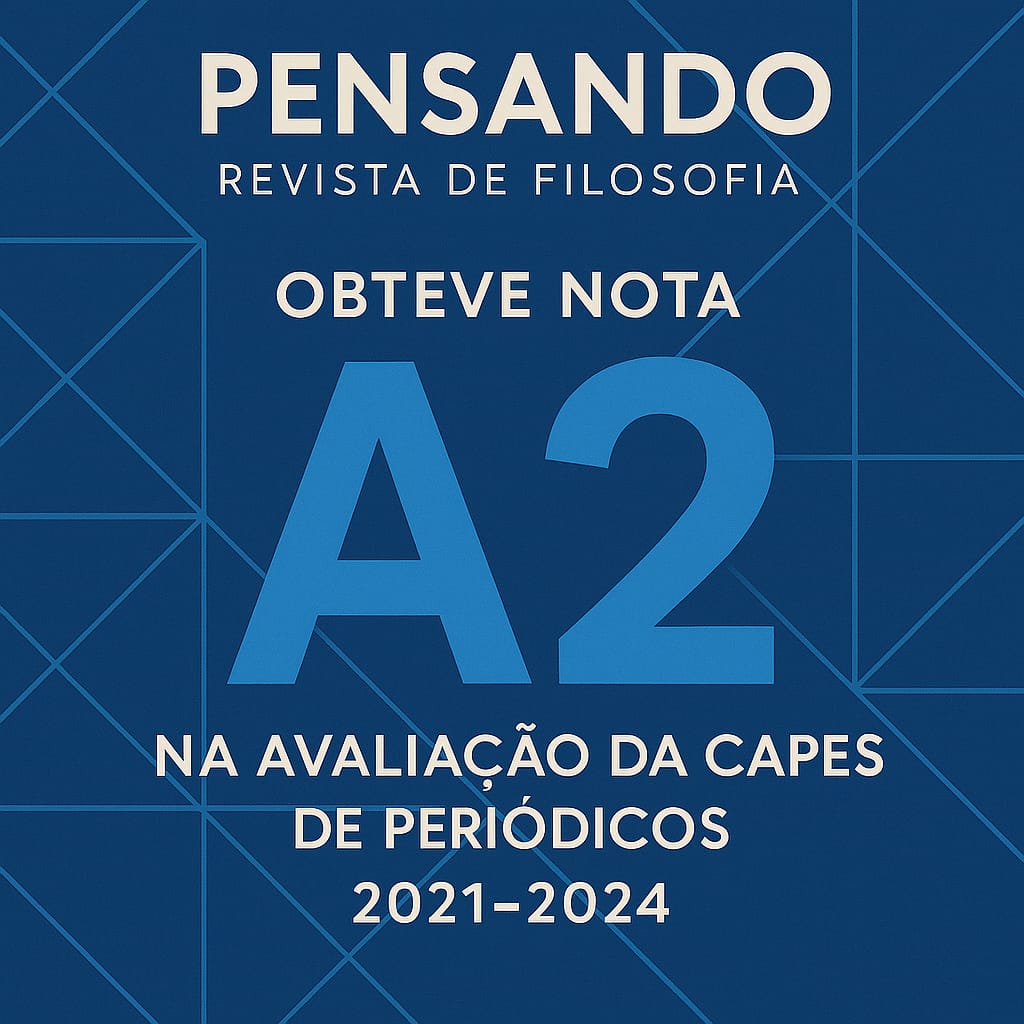Pensamento crítico como epistemologia aplicada
Realocando o pensamento crítico no panorama filosófico
DOI:
https://doi.org/10.26694/pensando.vol15i34.5952Palavras-chave:
Epistemologia aplicada, Pensamento Crítico, Lógica informalResumo
Tradução para o português do artigo “Critical Thinking as Applied Epistemology” do epistemólogo Mark Battersby. É um dos artigos fundadores da abordagem epistemologicamente motivada do pensamento crítico. Fez contribuições inéditas para a época e necessárias atualmente, fomentando não apenas a fundação de subdisciplinas da epistemologia, mas sobretudo incentivando corretamente que o Pensamento Crítico não se resume a mera instrução e correção pedagógico-cognitiva, consistindo em um projeto de aplicar normas epistemológicas em nossas atividades cotidianas epistêmicas, cujo nome correto seria Epistemologia Aplicada. Começa argumentando por analogia explicitando como ocorreu a reconfiguração da Filosofia Moral no último século em termos de ética normativa, metaética e ética aplicada, evidenciando que o mesmo tem ocorrido com a Epistemologia nas últimas décadas. Por fim, revela a epistemologia subjacente às teorias do pensamento crítico para argumentar que consistem em um esforço significativo de oferecer respostas a questões comuns sobre o que devemos acreditar e como devemos acreditar no que acreditamos.
Referências
ALSTON, William P. Meta-Ethics and Meta-Epistemology. In: GOLDMAN, A. I; KIM, J. Values and Morals. Dordbrecht: D. Reidel Publishing, 1978. p. 275-297.
AUSTIN, J. L. Other Minds. In: URMSON, J; WARNOCK, G (Orgs). Philosophical Papers, Oxford: Oxford University Press, 1979. p. 77-116.
BATTERSBY, Mark. Assessing Expert Claims: Critical Thinking and the Appeal to Authority. In: Proceedings Montclair College Conference on Critical Thinking. New Jersey: Montclair State College, 1988.
BAILIN, Sharon. Creative and Critical Thinking. Informal Logic, v.9, n.1, p. 23-30, 1987.
BRANDT, Richard. Epistemology and Ethics, Parallel Between. In: EDWARDS, Paul. The Encyclopedia of Philosophy. New York: Macmillan, 1967. p. 6-8.
FRANKENA, William. Ethics. New Jersey: Prentice-Hall, 1973.
GIERE, Ronald. Understanding Scientific Reasoning. New York: Rinehart, 1984.
GOVIER, Trudy. Selected Issues in Logic and Communication. Belmont: Wadsworth, 1987.
HARDWIG, John. Epistemic Dependence. Journal of Philosophy, v.82, n.7, p.335-349. 1985.
HUME, David. Enquiry Concerning Human Understanding, 1748.
JAMES, William. The Will to Believe and Other Essays in Popular Philosophy. New York: Longmans, 1896.
MCPECK, John E. Critical Thinking and Education. Oxford: Martin Robertson, 1981.
POLANYI, Michael; Harry Prosch. Meaning. Chicago: University of Chicago Press, 1975.
RAWLS, John. A Theory of Justice. Cambridge: Harvard University Press, 1971.
SIEGEL, Harvey S. Educating Reason: Critical Thinking, Informal Logic and the Philosophy of Education. Informal Logic, v.7, n. 2/3, p. 69-83, 1985.
______. Educating Reason: Rationality, Critical Thinking, and Education. New York: Routledge, 1988.
THOMSON, Judith J. A Defense of Abortion, Philosophy and Public Affairs, v. 1, p. 47-64, 1971.
WEDDLE, Perry. Fact from Opinion, Informal Logic, v.7, n.1, p.19-26, 1985.
Publicado
Como Citar
Edição
Seção
Licença
Copyright (c) 2024 PENSANDO - REVISTA DE FILOSOFIA

Este trabalho está licenciado sob uma licença Creative Commons Attribution 4.0 International License.

























